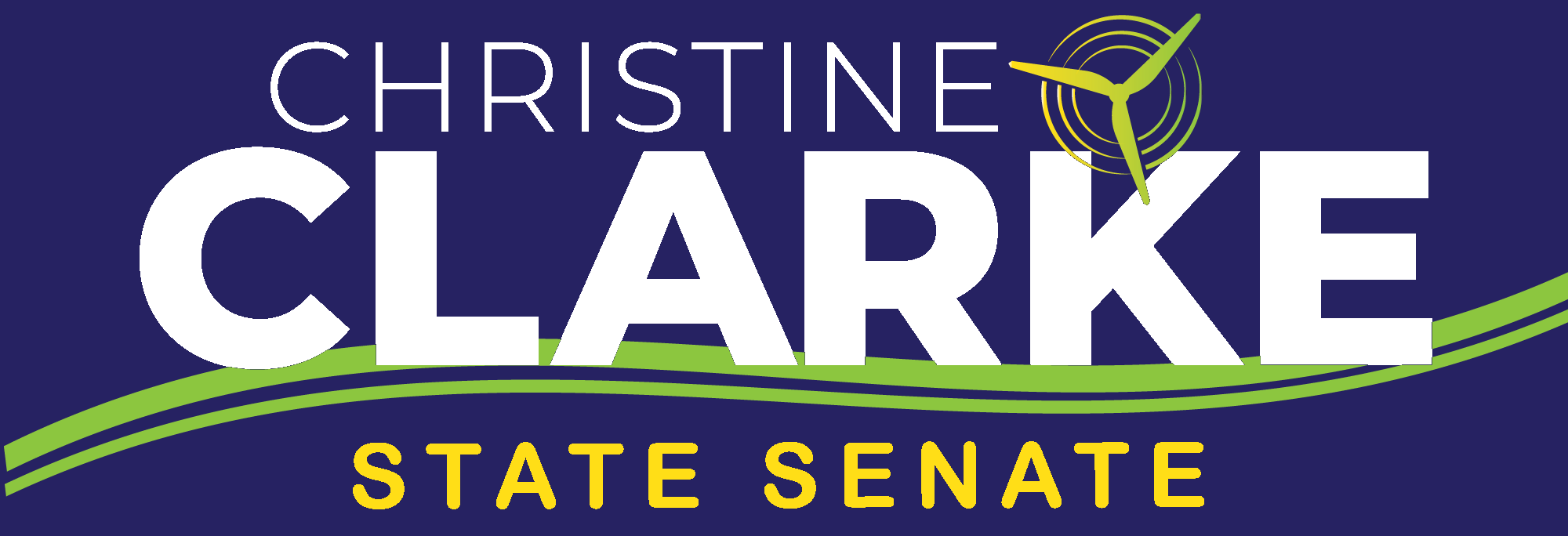
Urgent Challenges Require Decisive Action
Well-paying careers in the clean energy economy
Christine Clarke has been advocating for years for a just, green transition to a clean energy economy not only because it will help protect New Jersey from the worst projections of climate change impacts, but also because it is profitable and will create well-paying jobs and spur critical economic growth. Recent studies by the American Wind Energy Association show businesses favor development in areas where wind farms are available; major corporations from Microsoft to McDonalds are buying into wind farms and increasing their reliance on renewable energy. If New Jersey becomes the Atlantic Coast hub for clean solar and wind energy, our state also becomes a more desirable place for businesses to thrive and for young professionals to live, work, play and raise their families. We are poised to do it, too: New Jersey has ideal offshore wind conditions and conservative estimates indicate the U.S. has four times its national energy needs in untapped wind off our shores. BOEM representatives have suggested that potential is far higher.
Market indicators prove the clean energy transition is no longer a question of ‘if,’ it’s a question of when; how quickly; how fairly; whether the balance between new jobs, job training and preservation of workers’ employment will be managed successfully; and who will lead. Solar energy is now the cheapest form of new energy to buy. The cost of wind farms has dropped by more than half in recent years. It’s now more expensive to operate fossil fuel plants than to install new solar and wind farms. Private industry is making tremendous investments into moving into the booming, thriving renewable energy market. The fastest-growing jobs around the U.S. right now are ‘wind turbine technician’ and ‘solar/PV installer,’ and after the passage of New Jersey’s Executive Order 8 and Clean Energy Act in 2018, and Executive Orders 92 and 307 increasing our state’s offshore wind commitment to 7500MW by 2035 and 11,000MW by 2040, New Jersey is poised to lead-not-follow in this competitive industry to our economic benefit. We’re building the country’s largest parts and manufacturing facility on a former fossil fuel refinery site, and the new New Jersey Wind Institute will invite cross collaboration to ensure our youth entering the workforce are prepared for career positions in these cutting edge industries. These industries also hire many returning veterans and provide long-term careers that can not be outsourced.
Moving to renewable energy will create tens of thousands of well-paying jobs, and hiring has already started. These new jobs will keep families here, give our students excellent career positions to enter as they graduate school, and create new supply chain work and economic growth that will generate revenue for our overtaxed state. We need leaders committed to continuing the important work that has been done under the Murphy administration to advance New Jersey’s national and regional leadership in developing clean solar and wind.
It’s not just about business opportunities and creating jobs, either. Climate change is upon us. Precipitation has increased by 8% in New Jersey between 2010 and 2020. Flooding is a serious concern for our municipalities. New Jersey faces a projected 1.1 feet of sea level rise by 2030 and over 2 feet by 2050 if we don’t meet the challenges of this moment in time. Let’s be a model for the nation on smart policy, and lead change together.
Fighting for our children’s rights and autonomy
Our children deserve to inherit an America in which the rights, privacies and freedoms their parents enjoyed growing up are at least protected - if not expanded. The attacks on human rights happening on account of partisan extremism offend the very sensibilities of most Americans, and of course, the rights and autonomy of the targeted.
Christine respects the work, tireless efforts and legacies of our foremothers in fighting for hard-won liberties our daughters and sons are supposed to enjoy, no matter who they are, how they identify, who they love, or how their bodies are made. She believes we all deserve the essential Constitutional rights to life, liberty and the pursuit of happiness.
Working Class approach to budgeting
Families who have had to work within the constraints of ALICE household budgets know what it is to keep a running cost-benefit analysis of dollars spent in considering household spending. They have to do this mental work every time a major expense comes up. Every time a child needs braces or a tooth pulled, every time an installed appliance breaks at home, every time they have to call a plumber or an electrician. Working class moms operate from a place of assuming the need for accountability in how dollars are used by default, because there aren’t enough of them for everything our families may want or need and the questions that may naturally arise need answers. State budgeting should be subject to the same thinking, process and assessment, particularly coming out of the pandemic. Like never before, supply of funding will be limited and demands for its use are high.
The answer to our budgetary concerns can not simply be more borrowing or more taxes on the working class. We need to look at policies that would increase our supply of funding without more borrowing, like creating a state bank, implementing tax fairness policies, and making budgetary choices that create more jobs, in much the same way that parents in a scarcity situation might consider taking a second job to supplement income and support their children. We also need to have the difficult conversations that come with prioritizing expenses in much the same way as parents in ALICE households decide each month which bills are most important to pay. As a married mother of four, Christine knows these choices well and will bring this perspective with her to Trenton.
Healthcare for everyone, regardless of employment status
If the Covid-19 pandemic has taught us anything, it’s that quality, affordable healthcare is a moral imperative and must be accessible for all of us. Not only is it important for each of us as individuals, access to high-quality healthcare benefits the entire community. From the kids who play and learn with our kids, to the neighbors and workers we interact with regularly at grocery stores, gas stations, doctor’s offices, community parks and clubhouses, and more, our health is connected inextricably to public health and we all fare better when we all have access to top quality care.
As someone whose beloved aunt suffered a preventable death at a young age for lack of health coverage, Christine knows personally how critical affordable, accessible coverage is for our families. She also knows first-hand how often working families put the healthcare of the children in the family ahead of their own, and how in a budget-constrained household, those choices can have lasting impacts on wellness and, ultimately, parents’ longevity. Not only did the preventable loss of her aunt make this painfully clear, but under the current inequities of our healthcare system and on a working class family budget, her husband and she have also had to make those same choices in order to provide for the children first, feed everyone and keep a roof over the family’s heads. Especially given the job losses of the covid-19 pandemic and corresponding losses of employer-provided coverage, healthcare is unattainably expensive for some and high costs can deter doctor and hospital visits. This has to change.
Christine supports access to quality, affordable healthcare and considers it a human right.
Clean air and water to protect our people, our planet and our legacy to our children
Clean water is increasingly important as climate change advances, and who owns access to that water is equally important. Publicly-owned water means people can have access to water as a basic human right, and so it should be, as water sustains life. When we treat water like another tradeable commodity, as we do with gold for example, we run the risk of the price inflation (as we have seen with crucial medications) and public being priced out of water access. The recent news that Wall Street can bet on the prices of California water should concern all of us, especially given the projections of extreme drinkable water scarcity in the not-too-distant future.
Water shortages won’t only harm water needed for human consumption, but they are going to put unnecessary burden on everyone from farmers to grocers to the consumers paying for fruits, vegetables, grains and the costs of protecting crops from water scarcity. We need to protect public ownership of and access to water.
We have a sacred stewardship responsibility with water in our district as well: Our beautiful Highlands forest in-district, which provides safe canopy for thriving plant and animal biodiversity, naturally absorbs harmful carbon emissions out of our air and safeguards wildlife, encourages ecotourism and supports small businesses, must be protected because it cleans and purifies the drinking water used by two-thirds of New Jersey residents.
We need to bring money back to our district for forest protection and prevention of harmful algal blooms (HABs) in our reservoirs and lakes. We need state investment in water infrastructure, and funds reserved for maintenance and upkeep. Around the state, lead pipes must continue to be replaced; harmful polyfluoroalkyl substances (PFAs) must be studied and addressed; statewide energy and transportation policies must continue reducing the potential for pollutants to contaminate our water, our air and our environment.
Christine Clarke believes clean air and clean water are basic rights. She will work to protect our natural and public resources, and prioritize good stewardship policies.
This includes challenging bad actors and holding them accountable.
Empathetic leaders who prioritize policy over politics
Remember when our elected officials were leaders we could admire? When they clearly cared about all of us, not just the people who voted for them or donated to them? Remember when public service was about good policy and not team sports? When politicians didn’t so often choose petty insults over policy debates?
Empathetic listening is important. Hearing through people’s hardships to understand what they need from leaders is a basic skill needed in public service. One does not have to give ground to cruelty and must not tolerate hate; but those can be symptoms of deep economic and social unrest. Leaders need to be able to recognize and address contributing factors that add harm, like policies exacerbating income inequality over time at the expense of working families. Leaders need to listen to understand rather than listen to respond, and respond to improve communication rather than to score a cheap video or audio clip.
Regardless of personal politics, a constituent should be able to interact with elected representatives and have substantive conversations on issues of concern. Regardless of personal politics, a constituent should be able to expect leaders to act like leaders and give the benefit of the doubt, a listening ear, and the opportunity for an exchange of ideas. We need to get back to courtesy, respect and decency in public service.
Christine Clarke will be an accessible leader who treats constituents with respect.

